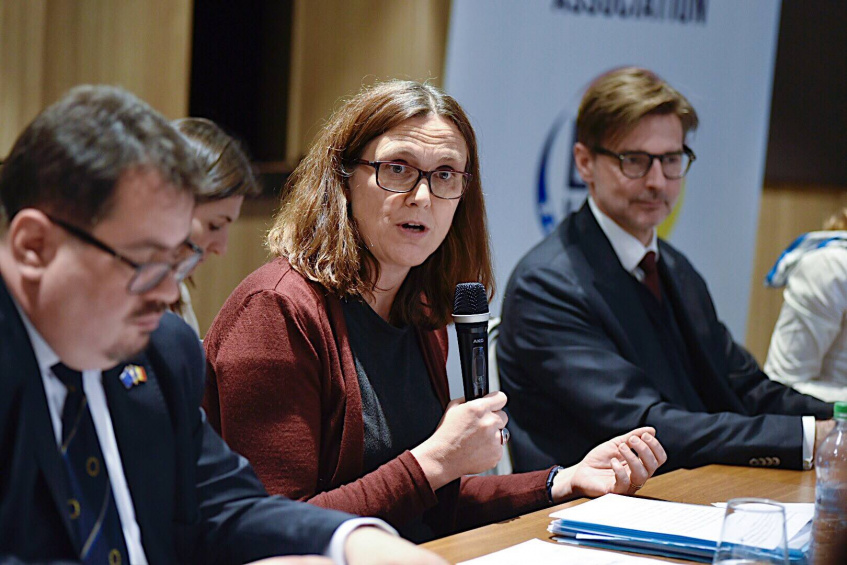
Trade between the EU and the Republic of Moldova has continued to increase since the entry into force of the deep and comprehensive free trade area (DCFTA) between the two countries, EU Trade Commissioner Cecilia Malmström said in a speech to the European Business Association in Chisinau on 6 November 2017.
“Our bilateral trade continues to increase – Moldova now relies on the EU for 66% of its exports. EU imports from Moldova have increased by more than 15% since the entry into force of the DCFTA. And the trend is even more pronounced in the first half of this year, with as high as a 20% increase,” the Commissioner said.
She welcomed the progress made on the adoption of policy planning documents and legislation in areas essential for facilitating Moldova's exports to the EU, such as sanitary and phytosanitary measures, technical barriers to trade, and customs procedures.
Citing a few examples, she said that over the past year, Moldova has:
- adopted roadmaps for reforms in the food safety system and technical regulations and standards related to safety of industrial goods
- is working on adopting a new customs code in line with the EU
- has adopted a comprehensive roadmap on regulatory and institutional reforms in public procurement.
“These reforms will lead not only to approximation with EU standards but also to savings of taxpayers' money,” she said.
Implementation of new laws
Malmström said the focus should now on implementation and enforcement of new laws, which cannot be properly done without strengthening institutions in terms of staff, salaries and code of conduct. “This is why we have been closely following the comprehensive reform of the Moldovan public administration and civil service this year.”
The EU’s Trade Commissioner said efforts still needed to be made to reap the full benefits of the Association Agreement, which increases access to the EU market for Moldovan producers and exporters and further attracts EU and international investment.
“I am thinking in particular of the food safety reform which, once properly implemented, will enable Moldova to export its agricultural products, notably animal products, to the EU and other foreign markets but also benefit local consumers by increasing the quality of food.”
She said she was aware of the difficulties some Moldovan producers were facing in to adapting to EU quality standards or identifying customers in EU markets.
“However, I am positive that this will improve over time, as operators learn to know the EU market better and adapt their products to market requirements. Business promotion and improved marketing skills to enter the EU market are the right solution.”
EU support for SMEs
Since 2009, under the EU4Business initiative, the EU has provided financial support for 5,000 companies in Moldova and supported jobs in small and medium-sized businesses. “We will of course continue, in the context of the Association Agenda and the new Single Support Framework, to provide substantial financial and technical assistance to increase the export capacity of Moldovan companies - and to develop the private sector not only in Chisinau but also on the countryside,” Malmström said.
She also stressed the importance of the business climate and rule of law.
“The business climate depends not only on easy registration processes or streamlined inspections of companies; it depends much more on solid institutions that defend the rule of law and ensure a level-playing field for all businesses and citizens alike. The principle of integrity and transparency must be respected, above all, by the authorities, which should lead by example.”
She said the absence of reforms in these areas meant there was an untapped potential in the level of foreign direct investment in Moldova, which is needed to modernize and diversify the economy. “Pursuing the fight against corruption, ensuring policy stability and predictability, and improving access to finance would certainly attract more investors.”
Commissioner Malmström described the Association Agreement and DCFTA as the basis of mutual partnership between the EU and Moldova: “It is about the economy, and trade of course, but it is also about improving the life of citizens. Fundamentally, it is about shared values such as democracy, human rights, the rule of law, and the fight against corruption. It is very much a tool to bring our peoples together - that's actually the best part.”
During her visit to Chisinau, the EU Trade Commissioner also attended the launch of a new EU-funded project for visibility and communication of actions related to AA/DCFTA implementation. Malmström highlighted the importance of better communication around the DCFTA, saying entrepreneurs often had insufficient knowledge of the DCFTA and its advantages, as well as the financing opportunities that were available, holding them back from taking advantage of the new opportunities.
